By Arno Tausch · Tuesday, May 19, 2015 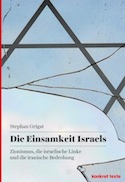 Die Einsamkeit Israels: Zionismus, die israelische Linke und die iranische Bedrohung (Israel’s Solitude: Zionism, the Israeli Left, and the Iranian Threat), by the German political scientist Stephan Grigat, is an important contribution to the overall debate on the Middle East, and it was published just in time, given the background of the Lausanne negotiations with Iran. Grigat dispels the current euphoria about the “breakthrough in Lausanne” and illuminates the many existing darker sides of the Lausanne deal. The present reviewer is of the opinion that, particularly in view of the special historical responsibility of Continental Europe, a careful reconsideration of the realities created in Lausanne and the considerable role played by the EU foreign policy machinery is necessary and that the other side in the conflict—the side of Israel—is also being heard. Die Einsamkeit Israels: Zionismus, die israelische Linke und die iranische Bedrohung (Israel’s Solitude: Zionism, the Israeli Left, and the Iranian Threat), by the German political scientist Stephan Grigat, is an important contribution to the overall debate on the Middle East, and it was published just in time, given the background of the Lausanne negotiations with Iran. Grigat dispels the current euphoria about the “breakthrough in Lausanne” and illuminates the many existing darker sides of the Lausanne deal. The present reviewer is of the opinion that, particularly in view of the special historical responsibility of Continental Europe, a careful reconsideration of the realities created in Lausanne and the considerable role played by the EU foreign policy machinery is necessary and that the other side in the conflict—the side of Israel—is also being heard.
Continue reading →
By Arash Falasiri · Monday, March 23, 2015 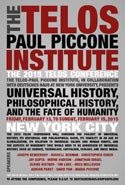 In his Critique of Judgment, Kant explains how “subjective judgments” resemble theoretical claims about truth in that they claim universal assent, even though they do not have an objective basis for doing so. In other words, although they are subjective, they assert a strict sense of objectivity and claim a universal ground for truth. Therefore, the proof of the validity of these judgments cannot be found in a specific “observable feature” of the object, but rather in the “actual intersubjective agreement.” While truth in his third Critique is neither a matter of the intellect nor a thing reducible to conceptual realm, it seems that he offers a different sense of truth that influenced the major trends in continental philosophy. One can trace this sense of truth as it provides a ground not only to “test the limits of our historical era” but also “to go beyond them.” In his Critique of Judgment, Kant explains how “subjective judgments” resemble theoretical claims about truth in that they claim universal assent, even though they do not have an objective basis for doing so. In other words, although they are subjective, they assert a strict sense of objectivity and claim a universal ground for truth. Therefore, the proof of the validity of these judgments cannot be found in a specific “observable feature” of the object, but rather in the “actual intersubjective agreement.” While truth in his third Critique is neither a matter of the intellect nor a thing reducible to conceptual realm, it seems that he offers a different sense of truth that influenced the major trends in continental philosophy. One can trace this sense of truth as it provides a ground not only to “test the limits of our historical era” but also “to go beyond them.”
Continue reading →
By Linas Jokubaitis · Wednesday, February 11, 2015 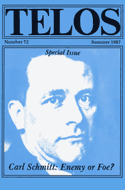 In his essay “Political Aesthetics: Carl Schmitt on Hamlet,” David Pan puts forward an interpretation of the relationship between aesthetics and politics in Schmitt’s discussion of Hamlet. Today the question about the relationship of aesthetics and politics in the thought of German jurist is a widely discussed topic. According to one interpretation, which is best represented by a sentence of Jürgen Habermas, “Carl Schmitt’s polemical discussion of political Romanticism conceals the aestheticizing oscillations of his own political thought.” But according to Schmitt’s self-understanding, this interpretation could not be further from the truth. In his essay “Political Aesthetics: Carl Schmitt on Hamlet,” David Pan puts forward an interpretation of the relationship between aesthetics and politics in Schmitt’s discussion of Hamlet. Today the question about the relationship of aesthetics and politics in the thought of German jurist is a widely discussed topic. According to one interpretation, which is best represented by a sentence of Jürgen Habermas, “Carl Schmitt’s polemical discussion of political Romanticism conceals the aestheticizing oscillations of his own political thought.” But according to Schmitt’s self-understanding, this interpretation could not be further from the truth.
Continue reading →
By Dirk Braunstein · Wednesday, August 27, 2014 An article by Hamid Dabashi recently appeared in the online version of the English-language edition of Al Jazeera. Dabashi teaches Iranian Studies and Comparative Literature at Columbia University, where the exiled Frankfurt School thinkers Max Horkheimer and Theodor Adorno found refuge during the period of National Socialism. Dabashi quotes Adorno’s 1949 thesis that it is barbaric to write poetry after Auschwitz and asks what it really means: “How could writing poetry after a calamity such as Auschwitz, and by extension a horror like the Holocaust, be something barbaric? Doesn’t poetry console in moments of mourning and despair?”
Continue reading →
By Aaron Bell · Tuesday, May 20, 2014 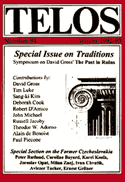 It is hard to imagine what Adorno’s corpus would look like without the deep scars left by his period of exile in the United States during the Second World War. Despite its catastrophic genesis, his exile played a constitutive role in the development of his thought, and made him, among many other things, a savagely insightful commentator on American life. This commentary on America is marked by a dialectic of fascination and disgust with his newfound home, perhaps the most “radically bourgeois country” (75) in the Western world. In particular, he was fascinated by America’s lack of cultural tradition. In his essay “On Tradition,” America serves as a model of a society ravaged by bourgeois rationalization, proudly celebrating its lack of tradition by rejecting “old world” values as archaic, irrational, and pompous. The relatively short history of the nation compounds the problem, further disconnecting us from any substantial sense of tradition or historical consciousness. We are proudly the country of the nouveau riche, possessed of power and wealth bereft of tradition and culture. This literal lack of history and evaluative rejection of tradition places America at ground zero of the crisis of tradition. Tradition survives in America in its most degraded and mutilated forms, manufactured in artificially aged consumer products and conservative “traditional” family values. The recent wave of gauche typographical décor emblazoned with the actual word “TRADITION” seems designed to confirm Adorno’s worst accusations. It is hard to imagine what Adorno’s corpus would look like without the deep scars left by his period of exile in the United States during the Second World War. Despite its catastrophic genesis, his exile played a constitutive role in the development of his thought, and made him, among many other things, a savagely insightful commentator on American life. This commentary on America is marked by a dialectic of fascination and disgust with his newfound home, perhaps the most “radically bourgeois country” (75) in the Western world. In particular, he was fascinated by America’s lack of cultural tradition. In his essay “On Tradition,” America serves as a model of a society ravaged by bourgeois rationalization, proudly celebrating its lack of tradition by rejecting “old world” values as archaic, irrational, and pompous. The relatively short history of the nation compounds the problem, further disconnecting us from any substantial sense of tradition or historical consciousness. We are proudly the country of the nouveau riche, possessed of power and wealth bereft of tradition and culture. This literal lack of history and evaluative rejection of tradition places America at ground zero of the crisis of tradition. Tradition survives in America in its most degraded and mutilated forms, manufactured in artificially aged consumer products and conservative “traditional” family values. The recent wave of gauche typographical décor emblazoned with the actual word “TRADITION” seems designed to confirm Adorno’s worst accusations.
Continue reading →
By Aaron Bell · Wednesday, April 23, 2014 As an occasional feature on TELOSscope, we highlight a past Telos article whose critical insights continue to illuminate our thinking and challenge our assumptions. Today, Aaron Bell looks at Theodor W. Adorno’s “Resignation” from Telos 35 (Spring 1978).
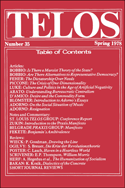 Reading “Resignation” today, it is immediately clear that the historical context is necessary to fully grasp the significance of Adorno’s words. Originally delivered as a radio address in 1968, “Resignation” is, among other things, an important entry in the Marxist theory-praxis debate and a primary document in the history of Adorno’s troubled relationship with the radical student movements of postwar Germany. Adorno, responding directly to the Frankfurt School’s critics of the radical left, defends his refusal to translate Critical Theory into a program for political action. Against the charge of apolitical “resignation,” Adorno articulates a defiant vision of critical thought beholden to no master. This vision of critical thought remains vital today, despite the dated trappings of the theory-praxis debate and the limited interest in Adorno’s biography and the politics of postwar Germany. Reading “Resignation” today, it is immediately clear that the historical context is necessary to fully grasp the significance of Adorno’s words. Originally delivered as a radio address in 1968, “Resignation” is, among other things, an important entry in the Marxist theory-praxis debate and a primary document in the history of Adorno’s troubled relationship with the radical student movements of postwar Germany. Adorno, responding directly to the Frankfurt School’s critics of the radical left, defends his refusal to translate Critical Theory into a program for political action. Against the charge of apolitical “resignation,” Adorno articulates a defiant vision of critical thought beholden to no master. This vision of critical thought remains vital today, despite the dated trappings of the theory-praxis debate and the limited interest in Adorno’s biography and the politics of postwar Germany.
Continue reading →
|
|
 Die Einsamkeit Israels: Zionismus, die israelische Linke und die iranische Bedrohung (Israel’s Solitude: Zionism, the Israeli Left, and the Iranian Threat), by the German political scientist Stephan Grigat, is an important contribution to the overall debate on the Middle East, and it was published just in time, given the background of the Lausanne negotiations with Iran. Grigat dispels the current euphoria about the “breakthrough in Lausanne” and illuminates the many existing darker sides of the Lausanne deal. The present reviewer is of the opinion that, particularly in view of the special historical responsibility of Continental Europe, a careful reconsideration of the realities created in Lausanne and the considerable role played by the EU foreign policy machinery is necessary and that the other side in the conflict—the side of Israel—is also being heard.
Die Einsamkeit Israels: Zionismus, die israelische Linke und die iranische Bedrohung (Israel’s Solitude: Zionism, the Israeli Left, and the Iranian Threat), by the German political scientist Stephan Grigat, is an important contribution to the overall debate on the Middle East, and it was published just in time, given the background of the Lausanne negotiations with Iran. Grigat dispels the current euphoria about the “breakthrough in Lausanne” and illuminates the many existing darker sides of the Lausanne deal. The present reviewer is of the opinion that, particularly in view of the special historical responsibility of Continental Europe, a careful reconsideration of the realities created in Lausanne and the considerable role played by the EU foreign policy machinery is necessary and that the other side in the conflict—the side of Israel—is also being heard.  In his Critique of Judgment, Kant explains how “subjective judgments” resemble theoretical claims about truth in that they claim universal assent, even though they do not have an objective basis for doing so. In other words, although they are subjective, they assert a strict sense of objectivity and claim a universal ground for truth. Therefore, the proof of the validity of these judgments cannot be found in a specific “observable feature” of the object, but rather in the “actual intersubjective agreement.” While truth in his third Critique is neither a matter of the intellect nor a thing reducible to conceptual realm, it seems that he offers a different sense of truth that influenced the major trends in continental philosophy. One can trace this sense of truth as it provides a ground not only to “test the limits of our historical era” but also “to go beyond them.”
In his Critique of Judgment, Kant explains how “subjective judgments” resemble theoretical claims about truth in that they claim universal assent, even though they do not have an objective basis for doing so. In other words, although they are subjective, they assert a strict sense of objectivity and claim a universal ground for truth. Therefore, the proof of the validity of these judgments cannot be found in a specific “observable feature” of the object, but rather in the “actual intersubjective agreement.” While truth in his third Critique is neither a matter of the intellect nor a thing reducible to conceptual realm, it seems that he offers a different sense of truth that influenced the major trends in continental philosophy. One can trace this sense of truth as it provides a ground not only to “test the limits of our historical era” but also “to go beyond them.”  In his essay “Political Aesthetics: Carl Schmitt on Hamlet,” David Pan puts forward an interpretation of the relationship between aesthetics and politics in Schmitt’s discussion of Hamlet. Today the question about the relationship of aesthetics and politics in the thought of German jurist is a widely discussed topic. According to one interpretation, which is best represented by a sentence of Jürgen Habermas, “Carl Schmitt’s polemical discussion of political Romanticism conceals the aestheticizing oscillations of his own political thought.” But according to Schmitt’s self-understanding, this interpretation could not be further from the truth.
In his essay “Political Aesthetics: Carl Schmitt on Hamlet,” David Pan puts forward an interpretation of the relationship between aesthetics and politics in Schmitt’s discussion of Hamlet. Today the question about the relationship of aesthetics and politics in the thought of German jurist is a widely discussed topic. According to one interpretation, which is best represented by a sentence of Jürgen Habermas, “Carl Schmitt’s polemical discussion of political Romanticism conceals the aestheticizing oscillations of his own political thought.” But according to Schmitt’s self-understanding, this interpretation could not be further from the truth.  It is hard to imagine what Adorno’s corpus would look like without the deep scars left by his period of exile in the United States during the Second World War. Despite its catastrophic genesis, his exile played a constitutive role in the development of his thought, and made him, among many other things, a savagely insightful commentator on American life. This commentary on America is marked by a dialectic of fascination and disgust with his newfound home, perhaps the most “radically bourgeois country” (75) in the Western world. In particular, he was fascinated by America’s lack of cultural tradition. In his essay “On Tradition,” America serves as a model of a society ravaged by bourgeois rationalization, proudly celebrating its lack of tradition by rejecting “old world” values as archaic, irrational, and pompous. The relatively short history of the nation compounds the problem, further disconnecting us from any substantial sense of tradition or historical consciousness. We are proudly the country of the nouveau riche, possessed of power and wealth bereft of tradition and culture. This literal lack of history and evaluative rejection of tradition places America at ground zero of the crisis of tradition. Tradition survives in America in its most degraded and mutilated forms, manufactured in artificially aged consumer products and conservative “traditional” family values. The recent wave of gauche typographical décor emblazoned with the actual word “TRADITION” seems designed to confirm Adorno’s worst accusations.
It is hard to imagine what Adorno’s corpus would look like without the deep scars left by his period of exile in the United States during the Second World War. Despite its catastrophic genesis, his exile played a constitutive role in the development of his thought, and made him, among many other things, a savagely insightful commentator on American life. This commentary on America is marked by a dialectic of fascination and disgust with his newfound home, perhaps the most “radically bourgeois country” (75) in the Western world. In particular, he was fascinated by America’s lack of cultural tradition. In his essay “On Tradition,” America serves as a model of a society ravaged by bourgeois rationalization, proudly celebrating its lack of tradition by rejecting “old world” values as archaic, irrational, and pompous. The relatively short history of the nation compounds the problem, further disconnecting us from any substantial sense of tradition or historical consciousness. We are proudly the country of the nouveau riche, possessed of power and wealth bereft of tradition and culture. This literal lack of history and evaluative rejection of tradition places America at ground zero of the crisis of tradition. Tradition survives in America in its most degraded and mutilated forms, manufactured in artificially aged consumer products and conservative “traditional” family values. The recent wave of gauche typographical décor emblazoned with the actual word “TRADITION” seems designed to confirm Adorno’s worst accusations.  Reading “Resignation” today, it is immediately clear that the historical context is necessary to fully grasp the significance of Adorno’s words. Originally delivered as a radio address in 1968, “Resignation” is, among other things, an important entry in the Marxist theory-praxis debate and a primary document in the history of Adorno’s troubled relationship with the radical student movements of postwar Germany. Adorno, responding directly to the Frankfurt School’s critics of the radical left, defends his refusal to translate Critical Theory into a program for political action. Against the charge of apolitical “resignation,” Adorno articulates a defiant vision of critical thought beholden to no master. This vision of critical thought remains vital today, despite the dated trappings of the theory-praxis debate and the limited interest in Adorno’s biography and the politics of postwar Germany.
Reading “Resignation” today, it is immediately clear that the historical context is necessary to fully grasp the significance of Adorno’s words. Originally delivered as a radio address in 1968, “Resignation” is, among other things, an important entry in the Marxist theory-praxis debate and a primary document in the history of Adorno’s troubled relationship with the radical student movements of postwar Germany. Adorno, responding directly to the Frankfurt School’s critics of the radical left, defends his refusal to translate Critical Theory into a program for political action. Against the charge of apolitical “resignation,” Adorno articulates a defiant vision of critical thought beholden to no master. This vision of critical thought remains vital today, despite the dated trappings of the theory-praxis debate and the limited interest in Adorno’s biography and the politics of postwar Germany. 






